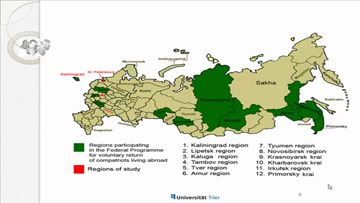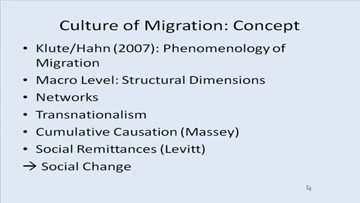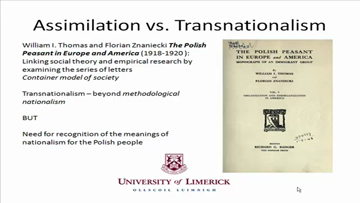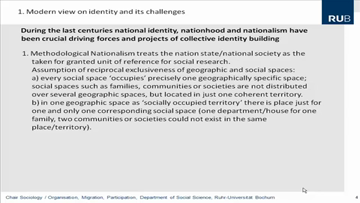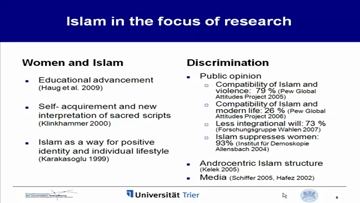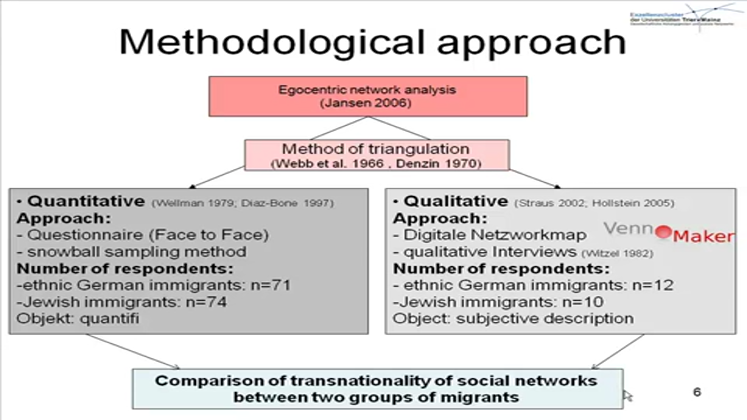Social Networks of Support
Ethnic German and Jewish Immigrants from Former Soviet Union in Germany
Since 1990 the term „transmigrant“ defines the discussion of migration. According to transmigration theory the process of leaving home country and integration into a host society involves the circulation between home and host societies, identities and social-, politic-, and economic systems. This new approach breaks the classical assimilation theory of “one-way process” of migration that finishes with the one-time and permanent change to another country. But in how far the migrants tend to transmigration can depend on their cohort, educational background and ethnicity.
One possibility to investigate this phenomenon is the method of social network analysis, which is increasingly used in the study of sociology of migration. This paper uses the instrument of social network analysis to investigate the transnationlity of ethnic German and Jewish immigrants from former Soviet Union based on social network analysis. The central focus of the research is the analysis of embeddedness, social networks as well as their outcome in form of social capital.
Tatjana Fenicia studied political economy and German philology at the Universtity of Trier. Since 2008 she works as a researcher at the Cluster of Excellence “Societal dependencies and social networks" at the University of Trier. Her research focus is (re)migration, integration of migrants from former Soviet Union in Germany and in particular social networks analysis.
Panel I: Networks of Migrants - October 14th, 2011
The Resilience of People in Motion
-
54498 Hits
-
|
-
2 Votes
-
|
-
16 Beiträge
Processes of immigration, transmigration, and remigration in the wider Europe today
Europe is a continent shaped by migration. Every year millions of people are migrating into the European Union. Others are emigrating from EU member countries. Many are leaving their homes and are trying to integrate into the host country, while others circulate between their home country and their “new home”, leave the country of entry, returning back to their “country of origin”, or they even migrate on to third countries.
Migration is a complex process with constraints and opportunities. Its flows have created different patterns, regimes and even cultures of migration. It involves voluntary and involuntary aspects, economic and non-economic issues, constructions and reconstructions between physical and symbolic spaces. This stipulates also new ways of theorizing and researching in the field.
Strategies of Survival, Strategies of Resistence
Migrants and migratory groups adopt as well as resist to challenges and expectations by the mobility itself or the receiving society. They perform resilient and innovative strategies of survival.
They are resilient by maintaining their culture(s), system(s) of belief, traditions, way of life etc. Yet, they are innovative being open for change, being transformers, innovators, entrepreneurs themselves. Therefore, adoption, change and/or innovation vs. resistance, continuity and/or resilience have to be seen as part of the migratory agency. The migrants’ culture of resilience, meaning the maintenance of core elements of their livelihood, has to be conceptualized in an ever changing world challenging the integrity and cohesion of any, but especially migratory groups.
The Conference
The aim of the conference is to discuss new theoretical approaches, methodologies and empirical research results on immigration, transmigration and re-migration topics. It focusses on changing European migration regimes and discourses since the fall of the iron curtain until today.
Contact
Prof. Michael Schönhuth
University of Trier
Universitätsring 15
D-54286 Trier
+49-(0)6 51-201-27 10 (Office)
http://transmigration.eu/
Zu
The Resilience of People in Motion
